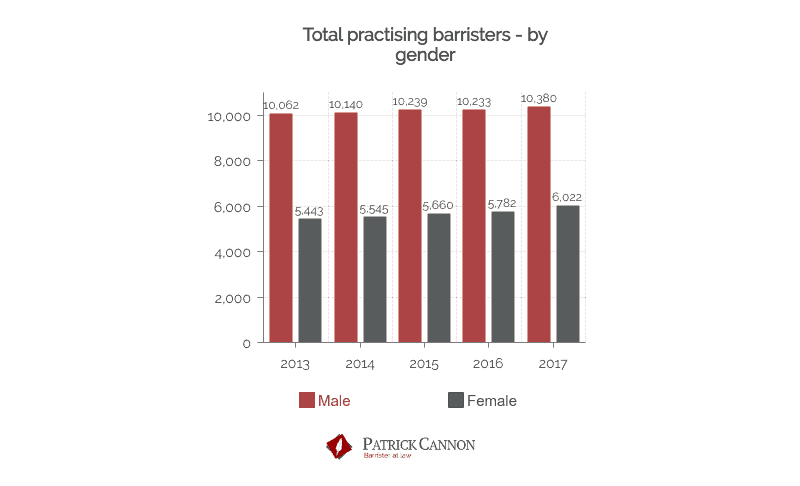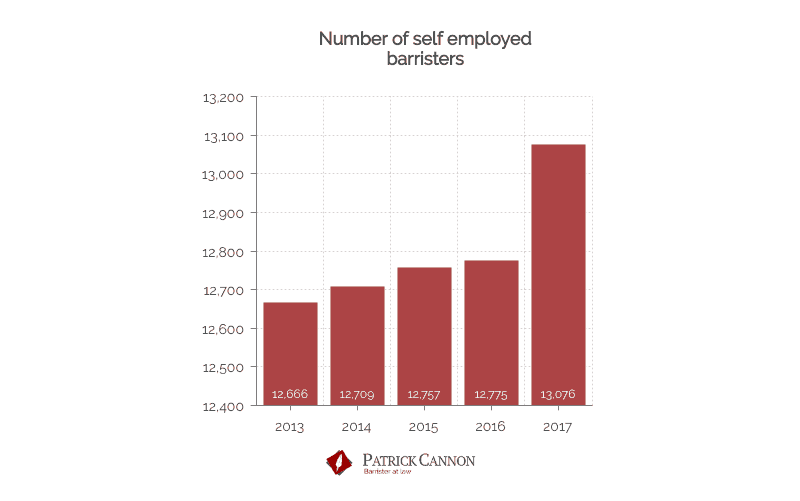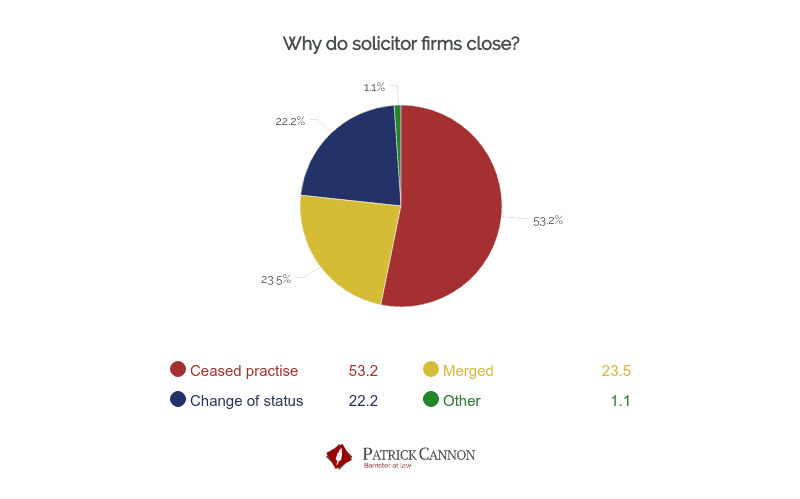
Reading about the world of law can feel highly complex, particularly when it comes to the extensive usage of terminology unique to this particular field. For example: barristers and solicitors are both legal experts, but practise law in different ways.
So what is the difference? What do they each do, how can one become qualified as a practitioner of either kind and how much do they tend to make?
Barrister Patrick Cannon has undertaken the extensive research below, enabling him to explain both barristers vs solicitor statistics in detail, comparing the two in order to fully explain the difference and help you discover a little more about both practices.
Read on to see what was discovered.

On average it takes 6 years for a solicitor to qualify 5 years for a barrister to qualify
Do I Need a Barrister or a Solicitor?
The most simple way to distinguish between a barrister and a solicitor is to take a look at what they wear in court. Barristers are required to don official wigs and gowns within a courtroom, while solicitors are not. The distinction runs far deeper than this, however, as barristers are often called upon to represent and advocate for a litigant in the courtroom, but do not tend to work on the litigation with them beforehand.
Solicitors tend to specialise in specific areas of law, including commercial, criminal, financial, employment and others. They usually undertake more of the litigation work and preparation away from the courtroom and represent clients on lower levels of the court. Solicitors often provide a barrister with full information regarding their client’s case, and it’s up to the barrister to prepare a detailed pleading to present before a judge.
Barristers tend to be the more likely of the two to go on to become judges, though it is possible for both. It is also possible, in specific circumstances, for barristers to work in “dual capacity” and undertake both their own role and that of a solicitor.
How Many Barristers Are There in the UK?
At present, according to both the Bar Council and the Bar Standards Board, the population of practising barristers in both England and Wales totals approximately 16,435 individuals. This number has increased impressively since 2013 – by almost a thousand, in fact – and one of the reasons behind this leap is likely to be the swiftly growing number of women who have taken up the practice. In the same time frame, the number of female barristers leapt by around 580.

There are 6,022 women barristers and there are 10,380′ male barristers
2017 in particular saw a large number of barristers registering – over 300, to be exact – helped along by the massive leap in the number of self-employed practitioners in the country.

Employed Barristers Vs Solicitors
From April 2018 to March 2019, there were approximately 24 thousand barristers and judges employed in the United Kingdom. However, solicitors made up the majority of individuals working in the legal sector, with 128 thousand solicitors employed in the United Kingdom.
What is a UK Barrister’s Salary?
Salaries for barristers tend to increase with their experience. The average barrister tends to earn anything between £25,000 and £300,000, making this field very varied in terms of money-making. After ten years or so, a barrister in private practice can earn up to an impressive £100,000.
Meanwhile, those engaged within the Crown Prosecution Service or Government Legal Service can expect a slightly tighter pay bracket – between £30,000 and £90,000. Professionals within these specific fields will also usually see a slower rise in their wage, often experiencing an increase to £200,000 after five years.
How Long Do Barristers Take to Qualify?
The first steps towards becoming a barrister are the same as those required to be a solicitor. Aspiring legal minds must first take a three year LLB (Bachelor of Law) degree, or, if they have already qualified in a different subject area, take a one-year Graduate Diploma in Law to convert that qualification.
From here, trainee barristers must take both a Bar Professional Training Course, which is usually completed within one year and then a year-long pupillage – similar to an apprenticeship – which is conducted in the barrister’s chambers.
This means that a barrister is considered fully qualified after a minimum of five years.

The Working Life of a UK Barrister
According to this research, while 89% of all barristers find their work interesting, work within this position can clearly prove stressful; only 45% feel able to balance their work and home life in a way that is comfortable for them. Those working in family and criminal law reported being the most stressed, with 33% of family barristers experiencing working weeks of over 60 hours and criminal barristers admitting to working unpaid for at least one day a week. In fact, over a third of all barristers work additional unpaid hours to help clients who can’t afford the extra.
The age at which a barrister retires can vary hugely, with many practitioners working beyond 70 despite the accepted UK retirement age standing at 65 for men and slowly increasing to the same for women.
How Many Solicitors Are There in the UK?

There are 143,1998 solicitors in the U.K and 16,435 barristers in the U.K
As of the end of 2018, the number of solicitors practising in the UK had reached 143,198 – outstripping the number of solicitors by almost 127,000. This represents a steady increase from the almost 115,500 practising in 2009.
In 2017, the number of registered female solicitors rose higher than that of their male counterparts by just 1%. Also, only one third of those accepted onto an LLP law degree within the same year were male.
There is a good provision of positions for solicitors within the UK. At the end of 2018, the number of incorporated legal firms hit 4,800 – a 2,902 leap since 2010.
As of the close of 2018, 46% of solicitors worked in criminal law, just over 33% in civil law and just under 30% took on elements of both.
The world of the solicitor is quickly becoming more and more diverse. In 2016, the number of Black, Asian and minority ethnic (BAME) individuals holding practising certificates rose by 16%, and their number has more than doubled since the millennium.
As of 2020, there were approximately 135 thousand solicitors in employment in the United Kingdom, compared with 109 thousand in the previous year.
What is a UK Solicitor’s Salary?
Solicitors tend to charge an hourly fee, as their work often centres around an office location and involves meetings with clients. The average wage of a solicitor sits at around £250 per hour, but there are no fixed rates of pay, so these can increase virtually endlessly depending on the reputation of the individual solicitor or firm in question, as well as the level of experience held, their relationship with the client and the difficulty of the case in question.
Trainee solicitors at commercial firms are usually paid between £25,000 and £40,000. Fully qualified solicitors in larger firms tend to earn from £25,000 to £40,000 per annum, while those in larger companies can bring in between £58,000 and £65,000 – with London-based firms regularly offering salaries higher than £80,000.
In general, senior lawyers can earn up to £90,000, with partners rising beyond £100,000 way into the millions.
How Long do Solicitors Take to Qualify?
After taking either an LLB degree or converting with a Graduate Diploma as previously mentioned, a vocational Legal Practice Course should then be taken by any aspiring solicitor. This lasts a year full time. Following the LPC, up and coming legal specialists should apply for a training contract within a law firm of their choice. After this is complete, an application can be made to the official roll of solicitors – acceptance of which means an individual has completed their training and can practise.
This whole process takes six years at its shortest.
There is, however, a plan to change elements of this system to make it more accessible; the LLP and GDL is to be replaced for solicitors in 2020, becoming the Solicitors’ Qualifying Examination.

The Working Life of a Solicitor
Employment as a solicitor can prove just as stressful as working as a barrister. Because solicitors deal more directly with the general public, there is much more likelihood of complaints being raised against them by unsatisfied clients – who can be awarded up to £50,000 in compensation if the Ombudsman finds in their favour.
Newly qualified solicitors within UK firms are also paid considerably less than those in US-run companies. They can take home as little as £18,000 per year, while individuals working for American firms can earn as much as £130,000 in the same amount of time.
Get In Touch
For professional and insurance reasons Patrick is unable to offer any advice until he has been formally instructed.


